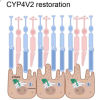Gene therapy can modify mutations in genes or deliver an extra, healthy copy of an allele to treat inherited forms of blindness. Dr. Mahajan was a surgeon in the recent trial for gene therapy using a viral vector that successfully rescued vision loss in patients with Leber Congenital Amaurosis. The development of pre-clinical models to test gene therapy approaches for other forms of blindness, as well as testing gene therapy treatments in these pre-clinical animal models, is necessary and important to lead to clinical trials for human patients.
We are treating human patient stem cells and translational animal models with gene therapy approaches. We are also developing animal models for various inherited retinal degenerative diseases by introducing human genes or human mutations into the animals.
Pluripotent stem cells are made in the lab from patient volunteers with retinal degenerations. We then use gene editing (CRISPR) to correct the patient mutations in their own cells. Our lab was the first to correct a human blindness gene in human stem cells. These gene-corrected cells can then be used to test therapies and create transplants that replace diseased retinas.







